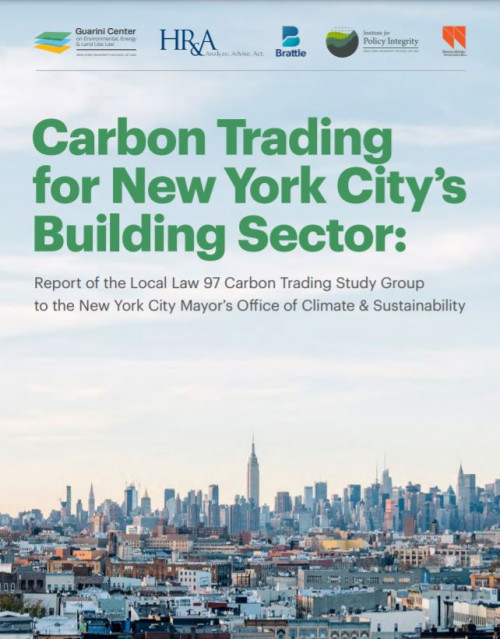-
Comments to FERC on Mitigation Technical Conference
We submitted post-technical conference comments to FERC regarding its authority to consider greenhouse gas emissions and to impose mitigation conditions in assessing whether to grant a certificate of public convenience and necessity for interstate natural gas pipelines and other infrastructure projects. Our comments also recommend that the Commission prescribe reasonable default estimates for calculating emissions and monetize climate damages using the social cost of greenhouse gases to assess the project's climate impacts under NEPA and balance them against benefits under the NGA.
-
Amicus Brief in Tenth Circuit Challenge to Oil and Gas Permitting in New Mexico
The Bureau of Land Management's approval of over 300 drilling permits in New Mexico would allow for an increase in production resulting in more than $1.6 billion in climate damages. We filed an amicus brief in the U.S. Court of Appeals for the Tenth Circuit criticizing the agency's analysis of the project, which inappropriately minimizes these climate impacts through comparison to nationwide totals. We explain that this approach does not facilitate a rational analysis of the project's climate effects.
-
Comments to AHRQ on Its Role in Climate Change and Environmental Justice
Policy Integrity submitted comments to the Agency for Healthcare Research and Quality (AHRQ) describing how the agency could integrate climate change and environmental justice considerations into its work.
-
Comments on BOEM’s Environmental Impact Statement for the Proposed Cook Inlet Lease Sale 258
The Bureau of Ocean Energy Management (“BOEM”) recently released an environmental impact statement (“EIS”) for its proposal to lease more than one million acres of submerged land on the Alaska Outer Continental Shelf for oil and gas development. BOEM proposes to take this action despite estimating that it could lead to more than $1.3 billion in climate damages, and despite presenting no estimate of the economic benefits, against which these climate costs might be compared.
-
Comments to CEQ on Proposed Revisions to NEPA Regulations
We submitted comments encouraging the Council on Environmental Quality (“CEQ”) to expand its legal and economic justification for its proposal to restore several key provisions to the regulations implementing the National Environmental Policy Act (“NEPA”) that were revised improperly in 2020. Our comments also suggest regulations and guidance that would promote the public welfare and enhance agency consideration of greenhouse gas emissions, climate risk, and environmental justice.
-
Comments to the Federal Insurance Office on Climate-Related Financial Risks
Insurers face and create climate risk as underwriters, investors, and risk-carriers. We submitted comments to the Federal Insurance Office (FIO) explaining how the office could use its authority to reduce these marketplace risks and to protect the affordability and accessibility of insurance.
-
Carbon Trading for New York City’s Building Sector
Report of the Local Law 97 Carbon Trading Study Group to the New York City Mayor’s Office of Climate & Sustainability
NYU researchers assessed whether New York City should adopt a carbon trading program for its buildings pursuant to its landmark climate law, Local Law 97 of 2019. The study offered two proposals for trading programs, both of which would benefit the City as a whole, and environmental justice communities in particular, and found that both proposals would lead to deeper GHG reductions and lower the cost of complying with LL97.
-
Joint Comments on Federal Agency Climate Adaptation and Resilience Plans
Policy Integrity joined other members of the Initiative on Climate Risk and Resilience Law to file comments on the Federal Climate Adaptation Plans recently issued as part of the Biden Administration's Whole-of-Government approach to climate change. Our comments recognize the importance of those plans' issuance and recommend further steps to ensure that federal agencies' approaches to adaptation reflect rigor, transparency, and coherence with respect to other climate-related objectives.
-
Comments to NHTSA on Proposed Car Standards
We submitted comments on NHTSA's proposed car standards, recommending ways that the agency could improve its modeling and address inconsistences between its and EPA's analyses. We also submitted joint comments on NHTSA's use of the social cost of carbon, recommending that the agency expand its justification of its discount rates and inclusion of global damages in the SCC.
-
Comments to DOE on Manufactured Housing Energy Conservation Standards
Policy Integrity submitted joint comments to the Department of Energy’s Supplemental Notice of Proposed Rulemaking for its Manufactured Housing Energy Conservation Standards. Our comments recommend that DOE provide additional rationale for applying the Working Group’s numbers, including by explaining why it is appropriate to focus on a global perspective of climate damages and exclude a 7% discount rate from its analysis of these damages.
Viewing recent projects in Climate and Energy Policy








